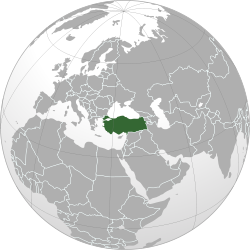How Do Negotiations Fit Into The Struggle Against Terrorism? – Analysis
By JTW
By Ihsan Bal
Many people interpret the meetings BDP held with Turkey’s President, Speaker of the Parliament and the ruling party as indicators or precursors of a new opening and reform process, of a negotiation process or a political “climate change” regarding the Kurdish issue. The articles and clauses included in the booklet published by the ruling party before the last congress, and the PM stating that “ a dialogue might start with Imrali if necessary” are also interpreted by various circles in the same manner. But all these “hints” should be regarded, from another angle, not as indications of distancing on the part of the authorities from the struggle against terrorism but more as an official bid to include negotiations as part of the greater process of combating terrorism.

Negotiation is a sub-heading below the main title of “process management” which necessitates the performance of disciplined projects and policies in coordination. The aforementioned process is comprised of dealing with the Kurdish issue at the outset, and also with the problem of terrorism which is a relatively minor obstacle in comparison with the former. To put it more clearly, negotiations held either overtly or covertly with individuals assumed to be representing the terrorists comprise a sub-heading of the main title of combating terrorism.
It means we have a serious problem if negotiations which are identified and implied with reference to Europe, to Kandil Mountains (where PKK leaders reside) or to Imrali (where Ocalan is jailed) are interpreted as a suspension of the process of counter terrorism. But we need to think, or at least hope, that neither the state nor the government handles the issue in such a naïve way.
Two different interpretations
The issue which has to be dealt with first is the degree to which the problems we are confronted by today are continuous with their past origins. We make a serious error when we assume that people who take to the mountains today do so because of the Kurdish problem 30 years ago and we then try to make sense of what is happening today on the basis of that causality. The PKK member with a gun in his hand today believes that he can achieve his goal through pressure on the Kurds and the Kurdish Street. Contrary to what is generally claimed, the priority of the organisation is not to bring the state to its knees but to do that to the Kurds.
Furthermore the efforts that Turkey has made in the fields of society, culture and the economy, are not going to cause the terrorists to be any less thirst for blood: rather as we have seen in recent years, they will increase that thirst. Security measures need to be enforced in the most effective manner possible against these people who are greedy for lives and blood: this is not just one option for the state; it is something it absolutely has to do.
Put a different way, this is not enough to establish that there has simply been a change taking place in the relationship between cause and effect within the terrorist organisations. We are now up against the incontestable fact that there are a lot of different countries which cause the organisation and its mentality to persist.
So, realism dictates that when talks and negotiations take place with regard to this struggle, these foreign forces have to be born in mind as they constantly manipulate the brain centres of the PKK as it trains its weapons on the streets of Turkey.
The aims of the negotiations
In order to ensure that negotiations do not act like dynamite on the fabric of society and that they are not aimed at unleashing an earthquake along the country’s seismic fault lines, an important idea must be born in mind. This is that care must be taken to avoid any actions which might give the impression that terrorism is a legitimate means of proceeding. There are a number of unfortunate cases in which this impression has been given: to mention only two of them , the headlines “Life after crossing the Habur Bridge [militants back from the mountains]” and “BDP MPs embracing the terrorists.”
It needs to be firmly understood that the real aim of the negotiations is to end the use of weapons and to make it absolutely clear that in Turkey today terrorism is no longer acceptable in any way as a means of pursuing a cause. If the goal that is being sought clearly is to get the boys on the mountain to give up their terrorist and enable them to embrace their mothers down on the plain, the process will gain the support of a large proportion of the people in this country. The aim of the fight against terrorism and crime is not to destroy people but to flush criminal behavior out of society.
In short, rather than interpreting recent developments as meaning that the armed struggle has been sacrificed to the negotiations, or that the one has overtaken the other, it is more appropriate to interpret it as a process in which a focused on human beings predominates and which aims to bring peace to society.
Ihsan Bal
Head of USAK Science Committee
